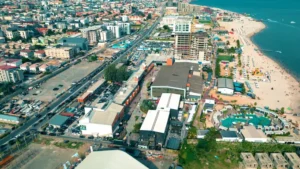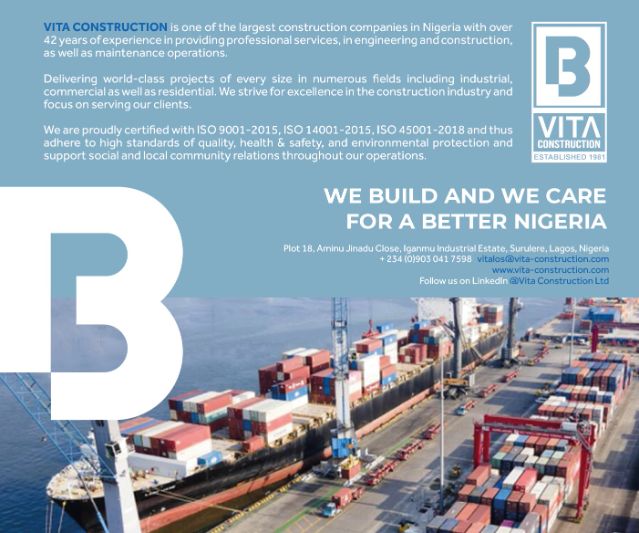When Lagos State authorities notified Nigerian business mogul Paul Onwuanibe in late March that he had seven days to vacate his multimillion-dollar beach resort so it could be demolished, he initially thought it was an early April Fools’ Day prank. Onwuanibe, aged 58, received a government letter stating that his Landmark Beach resort – a top-tier destination that attracted approximately one million local and foreign visitors last year – needed to be cleared as it fell within the right of way of a planned 700-kilometer (435-mile) coastal highway linking the former capital city to Calabar, a port city near the Cameroonian border. Despite obtaining the land in 2007 prior to the coastal highway plans, Onwuanibe expressed a mix of emotions upon receiving the demolition order, which also instructed him to file compensation claims. “One was amazement, the second was concern, and the third was, ‘is this real or is this an April Fools’ Day prank in advance?’” detailed Onwuanibe, who leads Landmark Group, a key player in Nigeria’s tourism and hospitality sectors.
The group’s leisure beach, recognized among Nigeria’s top seven beaches in 2023 by the Lonely Planet travel guide, is a valuable part of the 13-hectare mixed-use Landmark site along the Atlantic Ocean beachfront in Lagos’s affluent Victoria Island area. The beach resort and other sections of the Landmark site on the coastal right of way are scheduled for demolition, according to a government notice viewed by CNN.
Valued at over $200 million according to Onwuanibe, the Landmark site accommodates over 80 businesses and supports more than 4,000 direct jobs, generating over 2 billion naira ($1.5 million) in annual tax revenue, as stated by the company. Approval for the new coastal road was granted on February 27 by federal authorities, noted presidential aide Temitope Ajayi. Ajayi highlighted that the superhighway, upon completion, will be recognized among iconic coastal routes globally, similar to the Wild Atlantic Highway in Ireland and the Pacific Coastal Highway in the United States.
Environmentalists caution that while the coastal road project presents economic benefits, it also poses environmental challenges. “The road construction will undoubtedly result in significant impacts such as the destruction of wetlands, forests, and various habitats,” emphasized Lagos-based water and environment consultant Similade Adeodun. Activities like sand filling and dredging along the coastal areas also raise concerns, Adeodun told CNN.
CNN reached out to the Lagos State Ministry of Physical Planning and Urban Development for comments regarding the coastal right of way and the consultation process involved.
Born in the United Kingdom, Onwuanibe redirected his investments to Africa in 2007 due to the continent’s promising economic outlook. While he acknowledged the significance of the planned coastal project in connecting vital regions of the country, he expressed concerns about its potential negative impact on tourism in Lagos and foreign direct investment if Landmark Beach is ultimately demolished. “People who bring in money to make cities like this prosper will be very concerned with the proposed demolition of the beach resort,” voiced Onwuanibe, emphasizing the detrimental effect on inward investment and existing business operations.

Onwuanibe highlighted the substantial financial loss that would ensue if the beach is removed, with millions of dollars already invested in developing the resort. He underscored that foreign and local investors in Landmark Group have threatened to withdraw if the beach resort, renowned for its amenities like a mini golf course, beach soccer field, volleyball, and basketball court, is dismantled. “Without the beach, the entire ecosystem is at risk and severely damaged,” he emphasized, noting the apprehension expressed by international and local investors as well as local debt providers regarding the potential impact on the business’s sustainability.
Lagos state, Nigeria’s economic hub, has been actively seeking foreign investment while navigating economic challenges such as rising public and private debt, high inflation, and currency depreciation. However, “policy and regulatory inconsistency” and inadequate stakeholder consultation have impeded foreign investment in Nigeria, as outlined by a local think-tank, the Nigerian Economic Summit Group.
Environment consultant Adeodun urged authorities to conduct comprehensive environmental and social impact assessments prior to demolishing coastal businesses for the superhighway. Adeodun proposed exploring robust measures to preserve Landmark Beach, a significant revenue generator from eco-tourism, or considering alternative routes with minimal economic and ecological repercussions.
For Onwuanibe, the revised coastal highway should be a boon to thriving businesses situated along the coast rather than a burden. “The first step would be to conduct a thorough study and consultation with the most affected businesses along the route. It’s a long-term project, necessitating in-depth analysis,” he suggested, expressing optimism that dialogues with the government could yield a mutually beneficial solution. “The focus should be on ensuring that this highway serves as an advantage








